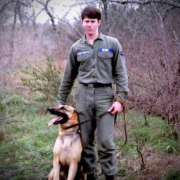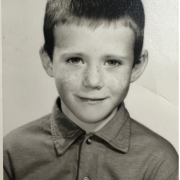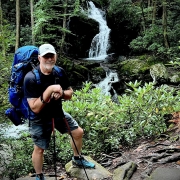Five Ways to Make Time Slow Down | Healthy Aging Series: Part 6
My wife and I were running errands the other day. We were fighting traffic on Bardstown Road and she shared some of the posts from some of her Friends on her Facebook page. Then, one of her past memories popped up from ten years ago. It was one where we had gone to Waterfront Wednesday for an outdoor concert ten years ago to see Company of Thieves. “Time flies,” I said, with a smile. It does seem to go by faster as you get older. You wake up and it’s December. Before you know it, a decade has passed.
Disclaimer: It is scientifically impossible to slow down time, and I’m pretty certain that time moves at the same speed whether you’re twenty or sixty. So, I’m really not going to give any suggestions for actually slowing down time.
What I am going to do is give some suggestions for making time more meaningful, or making the most of the time we have.
Your life is a tape measure.
A friend of mine told me the lesson that his father-in-law gave him about the value of the time we have left. He held out a tape measure to about 12 inches. He explained that the twelve inches represent your whole life. He then shortened it to 3 inches and said, “If you’re lucky, this is how much life you have left when your sixty.” Hold your hand out in front of you with three inches between you thumb and forefinger. Three inches, that’s it.
Making the Most of those Three Inches.
Okay, how do you make the most of the time you have left, whether it’s forty or twenty years? I’ve collected five practices that can help.
1. Practice Reflection.
Take some time each day, preferably before you go to bed, and think about your day. Think about your actions during the day. Reflect on the people that you had contact with during the day. How did you treat them? Did you follow the Golden Rule? You ask yourself if you could have done things differently, things that happened during the day. Reflection is about self-examination and growth. How did you handle criticism during the day? Did you spend the day honoring the things that you value? Consider the emotions that you expressed during the day. Did you overreact to anyone? Did you blow things out or proportion? If so, what would you do differently next time?
Reflect on each day’s activities, not for self-condemnation, but for self-appraisal, not for shaming yourself, but for learning lessons.
Tip: Before you go to bed this evening, find a quiet place and write a few lines in a journal about the day, successes and failures, and most important, lessons you learned.
2. Practice Mindfulness.
Mindfulness is the process of disconnecting from time. It is the practice of finding the meaning of the moment. You find a quiet place. It could be a corner in your home in a corner of the forest. I find that mindful-hiking helps me. I get lost in the forest and in my thoughts. I walk without thinking. Without judgment and with full acceptance, I let my ego fall silent and allow the shadow to come to consciousness. At times, I talk to my parents, who passed on years ago, and I let them speak to me from my unconscious. I dream during these times. I let my senses affect me: the bird-sounds, the musty smells, the glossy leaves, and the intermittent breezes.
Tip: Take a one-hour walk in the woods or the park by yourself. Let your mind drift. Hikers experience something called Hiker Dissociation. It’s amazing.
3. Practice Youthfulness.
We tend to take things way too seriously! I’m not sure if this is a side-effect of the PURPOSE DRIVEN LIFESTYLE that has become popular on social media. Maybe it’s because we’ve forgotten how to play. Maybe it’s because we have forgotten how to see the world the way children see the world. Alan Watts, the philosopher said, “The physical universe is basically playful. There is no necessity for it whatsoever. It isn’t going anywhere.” He rejects the idea of life being a journey and compares to dance. Dancing should be fun! Dancing is invigorating! Dancing is play! Watts’ admonition is: Don’t take life to seriously!
Tip: Take some time today and be playful. Turn on some music and dance. And sing. Try to see things that way a child would see them.
4. Practice Gratitude.
The Stoics used a practice called Negative Visualization. It involved visualizing your life without the things that you value, like your health, wealth, or family. “All things human,” Seneca reminds us, “are short-lived and perishable.” Negative visualization is a for of gratitude. Its ultimate goal is to help us value the things we have and the people in our lives by imagining what our lives would be like without them. It teaches us to have gratitude for what we have. We stop wanting more and teaches us to value the things that we already have. It teaches us the meaning of a goodbye kiss, knowing that it could be the last. Practicing gratitude forces you to stop and think about what you have now.
Tip: Take some time today and imagine your life without someone or without something that you value in your life. Take this very slow and ponder on it for an extended period.
5. Practice Flexibility.
One of the slogans that I live my life by is You have to adjust to the things that won’t adjust to you. Life will always throw you a curve ball. No matter how hard you plan things, sooner or later, those plans are going to have obstacles. Being flexible means living life on life’s terms. I can go on and on, but you get my point. Rigid people are always frustrated because rarely do things turn out the way they expected. Maybe, being flexible means lowering your expectations of people, places, and things. It insures that you’ll rarely be disappointed with the mundane events that make up our day to day existence.
Tip: The next time you get frustrated about something not going the way you planned, take a few minutes and breath. Tell yourself, I can’t control people, places, and things; I can control my expectations.
This is part six in the Healthy Aging Series, written by Mark Neese, LCSW, BCBA. To see more entries in this series, click here.













